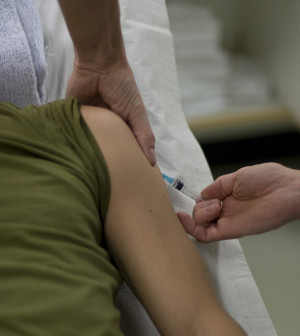- Could Your Grocery Store Meat Be Causing Recurring UTIs?
- Are You Making This Expensive Thermostat Error This Winter?
- Recognizing the Signs of Hypothyroidism
- 10 Strategies to Overcome Insomnia
- Could Artificial Sweeteners Be Aging the Brain Faster?
- Techniques for Soothing Your Nervous System
- Does the Water in Your House Smell Funny? Here’s Why
- Can a Daily Dose of Apple Cider Vinegar Actually Aid Weight Loss?
- 6 Health Beverages That Can Actually Spike Your Blood Sugar
- Treatment Options for Social Anxiety Disorder
Heavy Kids Fare Worse in One Way After Surgery

Here’s yet another reason to watch your child’s weight: Overweight and obese kids seem to be more likely than others to develop a wound infection after surgery, a new study suggests.
Researchers have already documented this connection in adults. But, “research on this topic among children and adolescents is scarce,” said study co-author Dr. Catherine Hunter, one of the study authors.
“The information from this first-of-its-kind study can now be used in assessing and counseling preoperative pediatric surgical patients and their families,” said Hunter. She’s a pediatric surgeon at Ann & Robert H. Lurie Children’s Hospital of Chicago.
In the United States, childhood obesity has nearly tripled since the 1970s, which suggests more children may face these infections, she and her colleagues said.
Using statistics from a U.S. surgical database, the researchers focused on 1,380 patients aged 2-18 who developed surgical site infections after major surgery in 2012 or 2013.
Noting that 40 percent were overweight or obese, the researchers determined that the overweight kids had a 23 percent higher odds for infection. Obese kids had 43 percent higher odds.
The researchers also looked at 115 patients from a single surgical center who developed wound infections. They found that 30 percent of them were overweight or obese.
“When considering children, adolescents and adults, there are several theories as to why overweight or obese patients are at higher risk for infection,” Hunter said in a hospital news release.
These may include impaired wound healing due to lower oxygen pressure in the excess fat tissue surrounding the wound as well as impaired immune responsiveness, she explained.
“However, more studies need to look at this further,” Hunter added.
The study results were published recently in the journal Surgical Infections.
More information
Get tips for a successful hospital stay from the American Academy of Pediatrics.
Source: HealthDay
Copyright © 2026 HealthDay. All rights reserved.










